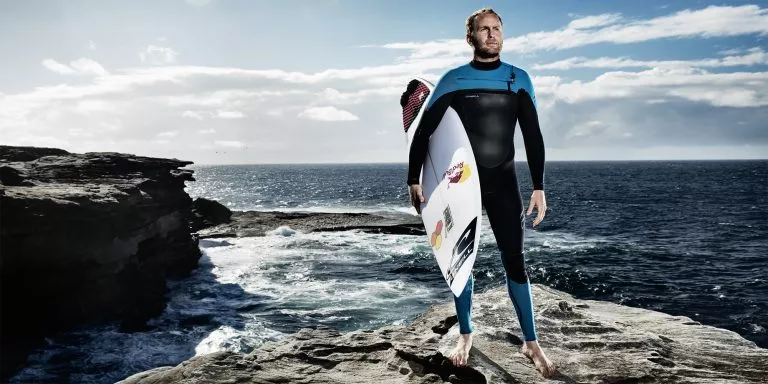Beyond Fear – Surfer Mark Mathews
As one of the best big wave surfers in the world, Mark Mathews has made a living from doing what few could imagine.
While in Tasmania, fifteen feet in front of a cliff in cold, shark infested waters, Mark hit a reef and instantly blacked out. Terror engulfed every inch of his being. Neck braced and hospital-ridden, he didn’t know if he could ever surf again. At that moment, Mark made a decision never to allow fear to overpower him again. He also made the decision to share what he had learnt in his industry with people from others.
He has deconstructed, fine-tuned, and personalised emotion and resilience techniques to successfully strengthen one’s mindset and sustain long term performance.
As a highly sought after international speaker, Mathews has graced the stages of leading companies worldwide. From Google, Sony and Intel, to MasterCard, he instantly captures audiences with his epic tales and spectacular ocean-themed adventure simulations.
Obsessed with the relationship between personal growth, high performance and fulfilment, Mathews is on a mission: Offer game changing ways to adapt to stress and strengthen mindset – Skills that he needed again in his own life when another wipeout in 2016 saw him landing feet-first on a shallow reef. The impact fractured his right shin, snapped his anterior and posterior cruciate ligaments, and tore an artery and nerve.
Doctors said that he probably wouldn’t be able to surf again. The sport that has defined him and his career. After 14 months of rehabilitation and focus he was able to enter the water again on a long board. His dream is be a big wave surfer again, but in the meantime he is helping others to fight fear and achieve their goals.
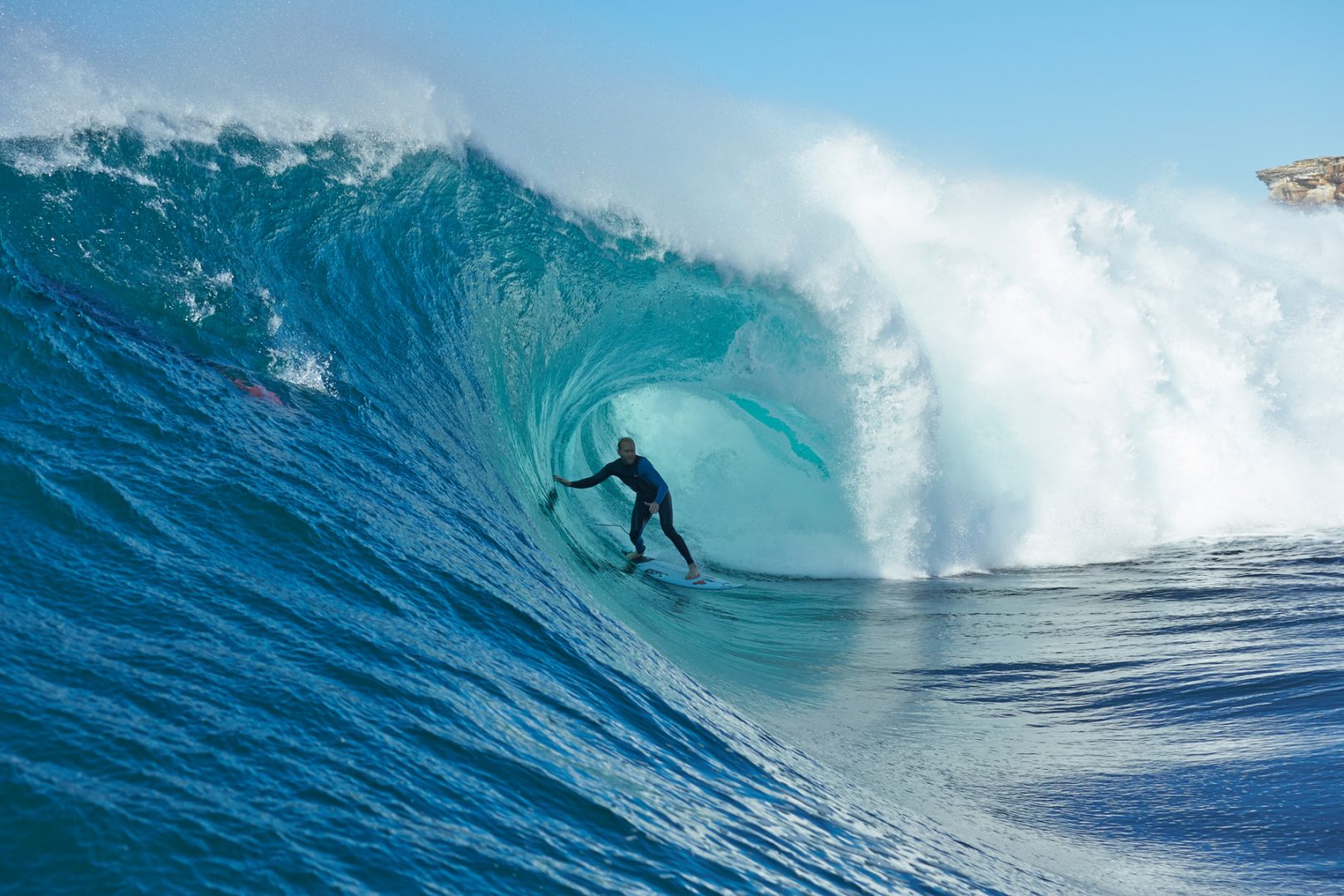
You’re over here this morning, talking to a room full of people who probably don’t understand the world of big wave surfing. What are they getting from you when you’re talking about to them about your experience?
I’d say at least 90% of the people that I do my keynote talk to, don’t surf at all. But performance is performance, it doesn’t matter what you’re doing. Whether it’s sport, business, personal life relationships; performance is just performance. What underpins all performance is motivation and ability. Then what enhances or takes away from those two things; what makes you more motivated, what makes you less motivated, what heightens your ability, what lessens your ability.
The takeaways of what I talk about would be the same as any area of performance but I just underpin it with my experience in surfing and all the surf footage that I have. It’s really just a way to anchor the messages of performance and make it entertaining for the audience.
I’m not going to say I’m telling anyone anything new because you can get what I’m saying basically anywhere. You can Google anything in performance and you’ll get all the knowledge that you need around how to perform better, but it just needs to be told in an inspiring way to make people do anything about it or to implement any of it.
That’s my favourite area. I love that aspect of performance, especially the motivation area. What makes some people strive really hard to be successful in one area of life? What is the matrix of things that goes into ability? It’s talent, it’s genetics, but then it’s knowledge. In this day and age, knowledge is everywhere. With a couple of clicks on your phone you can basically have the knowledge for anything. So it’s just this crazy world of performance and I just underpin it with surfing and cool surfing footage.
For some people it seems like everything in the world is against them but for some reason they’ll just keep on pushing through. Have you broken it down and looked at what those factors are?
Yeah, I think the most valuable part of performance is motivation.
How well can you motivate yourself? And then just as important, how well can you motivate your team around you? That’s where the crossover for corporates and companies is, that they have to motivate themselves to do better at what they do.
But then the next part of that is, can you instil that motivation in your team? That’s not an easy thing to do, in the corporate world especially because the goal and success don’t always align. You get high level CEO’s or leaders saying ‘This is what we’re trying to do, this is where the share price is going to go. It’s going to be amazing for our company.’ But does that translate to something that drives the individuals that make that happen?
To me, in the corporate world there’s a little bit of a disconnect. It’s like ‘We want to take the company here,’ but they forget to explain what that’s going to mean to the lives of their employees. If the company is super successful, what does that mean to the everyday worker that really is the one that underpins whether that happens or not.
For me, that’s the really important part of the corporate side of performance. You’ve got to get that workforce to want that goal as much as the shareholders want it and as much the CEO wants it, because his whole pay is in a bonus structure. Whereas, it’s not that reality for the workforce so that’s the interesting part of that.
You had the doctors telling you that you wouldn’t be able to surf again and you had the potential of losing your leg. How many times have you told the story around 2016?
It’s funny because I’ve done the keynotes and spoken to people for a long time before I had this latest injury and I use to talk about other injuries. Then I had this really severe injury, which is a dislocated knee, where I ended up with a permanent disability, I can’t control my foot.
The reality from the surgeons and everyone around is that my career is over, so that’s a certain level of adversity that I’ve got to face. Everyone faces degrees of adversity in their life and dealing with adversity is just another level of performing.
What I talk about is what helped me the most and it was more by chance. The lesson was around reframing your perspective of the situation. You can reframe that by looking at how much worse it could have been. And when you do that, you’re all of a sudden like, ‘Hold on a minute, I’m lucky it’s only this bad.’
That was forced upon me, because I was in the hospital and I was in a bad way as far as just being told my career was over. Pretty depressed, in severe pain – all the sort of things that add to that level of depression. But the I met a young guy who was a fan and who came up to see me, his name was Jason. He came up to my hospital room because he just wanted to say hello and get a photo.
It turned out he was a quadriplegic, he broke his neck about two or three months before I injured myself.
In the moment of just meeting him and shaking his hand, instantly my perspective changed, how could it not? This is where I could’ve been. I wiped out on a wave, got smashed into a reef and all of a sudden now I’m like I’m so lucky I landed on my feet and I just dislocated my knee because I really easily could’ve been in Jason’s position, if not worse.
So that moment just reshaped my perspective and from there I woke up every morning feeling lucky.
So two things happened; I have this new grateful perspective and on top of that, I see how well other people come to cope with way worse adversity. And it all changed the way my body physically responded, just feeling the gratitude consistently gave me more energy. And with more energy, I started to heal better, I started to sleep better, I started to deal with the pain better. All these different things just started to work and then fast forward a year and a half, I’m back surfing now.
I haven’t surfed big waves yet, I haven’t got my career back, but I know I can get it back because I never thought I’d get to where I am now. Sometimes you’re lucky enough to be shocked with something that shifts your perspective. If when I speak to people I can help shift that perspective in their life if they’re going through some adversity, then that’s my job done.
If I can get someone to think, ‘Yeah, work life is tough. I’ve got to deal with this change of role, it’s really stressful, I’ve got a lot on my plate, it’s tough.’ And their mental attitude is really difficult and then all of a sudden it can change to ‘Yeah, it’s difficult, but it could be so much harder, it could be so much worse.’ And then you see it in the audience faces, they’re like ‘Yeah, I can cope with this, I can do this.’ Just the change of perspective is the catalyst to a change of performance.
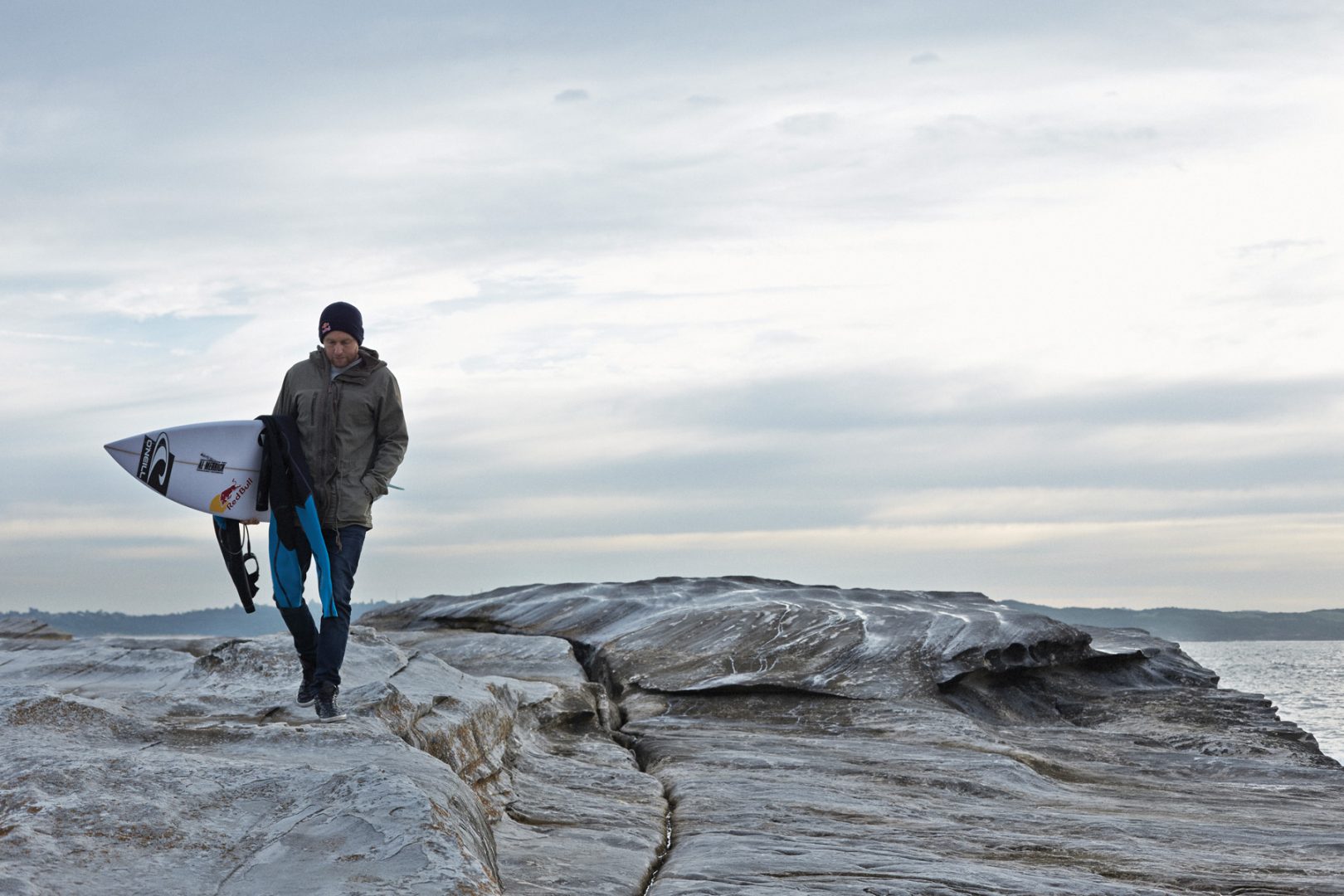
When you talk about how well Jason was coping with his position, how was he able to process it and see the positive side?
I don’t know if it’s for all people that suffer something that bad but it seems to be like you either choose to survive or you don’t. Your psyche is like ‘I’m either going to deal with this or I’m not,’ because it’s so bad, it’s so extreme.
It’s like an innate response, it’s almost like a survival mechanism in his brain where his focus just narrows to what he can do, what he can achieve. Everything else is put aside and you have to let go of what you can’t do anymore, because there is so much of that and it hurts so much to think about that. And now his brain is like ‘If I can get my hands to move that tiny bit more, I can pick up my own beer without having to sit back and ask someone to pour a beer.’ So for some reason that happens to them and that’s their coping mechanism. But when we’re looking from a distance, that’s just the ultimate lesson.
You can just implement that in your life and you don’t have that problem, your performance can go through the roof. And at the same time, I would speak to Jason and he would tell me of other quadriplegics that had it worse than him again. So it’s happening to him as well, there’s so many different degrees of that type of injury where the pain can be so much worse for another person, or the tiny bit of movement that they don’t have means that their life is drastically different again.
He’s doing it too and it just kicks me up the arse to be like ‘Stop whinging, just do it.’
I don’t know what the numbers are like in Australia but in New Zealand we’ve got some really horrific rates of suicide. Have you thought about what’s going on in this world where this is happening so frequently?
It’s just so tragic. I’ve looked into it a lot. I got told this morning, that a guy I know hung himself; he was only 40 and with two kids. And that’s the third person in the last three months that I’ve heard of.
It’s still the psyche side of performance, as far as how the brain works. But the more that I look into it, the more you start to realise that what those guys are dealing with to take the sort of violent, drastic measure to end their life, that’s not a lack of character or strength, that’s a totally different end of the spectrum. You can be depressed, you can be sad, upset. With these guys, you can’t even use the same terminology, it’s more like a severe pain that they’re feeling and there’s no rational thought that goes into what they do. You can’t pigeonhole them into that ability of just looking on the brighter side.
I hate when what I talk about gets confused with something like that, because it just does not work for that person. Of course a little bit would help, but from what I understand they look more like they’ve been diagnosed with severe cancer and at the moment, there’s not a cure for it. I think that’s the best way for people to understand what that level of depression is like. It’s a legit disease that they suffer and they’ve been given and at the moment there’s not standard medicine that is winning the war against it.
Maybe in the future, there may be different avenues, but that’s the hardest thing. The medicine to treat it is evolving, but the hardest thing is that it’s not the same cause all the time. It’s like having multiple variations of cancer, where one treatment helps that one but it doesn’t do anything for that person. One psych med might work for him, but it doesn’t work for him [another person].
Being a psychiatrist dealing with that level of depression I feel like would be one of the hardest jobs in society.
Are you thinking big wave next year?
I’m hoping so, fingers crossed. At the moment, I feel like – and I didn’t think this would happen – but I feel like I can surf good enough now to surf big waves. Technically I feel like I could do it but it’s just the fear of getting hurt again. And the fact that I don’t think all the surgeries and everything I’ve done would be strong enough just yet.
It would be too risky. If I wiped out on a big violent wave, the shaking underwater would maybe tear something again. At the moment, I couldn’t deal with going through another injury and more surgeries or ruining the one that they’ve fixed. At the start, they said I wouldn’t surf again, but the surgeons did such an amazing job which is one of the reasons I’m able to surf as good as I can now. So I don’t want to risk it just yet.
At the moment if I can get a late season swell in Hawaii, which is February, and test the waters there, nothing too huge. And then come into the Southern Hemisphere winter, New Zealand, Australia, South Africa in June/July when it starts to get really big, I think I’ll have enough time to get strong enough.
Does it mean a bit of a change in technique for you?
It’ll change the technique when I paddle. So when we don’t use the jetski’s to tow us in, I’ve got to paddle and getting to my feet is a little awkward because my foot is now stuck at 90 degrees.
Before the last surgery, my foot would just drop and dangle all the time so they fixed it at 90 degrees which has been the best operation I’ve had so far. It made it possible to get to my feet.
It’s still a little bit awkward. Sometimes I would jump up and land in the wrong spot on my board and it’s hard to change where my foot is. I think that’ll keep getting better and better and make it safer down the track.
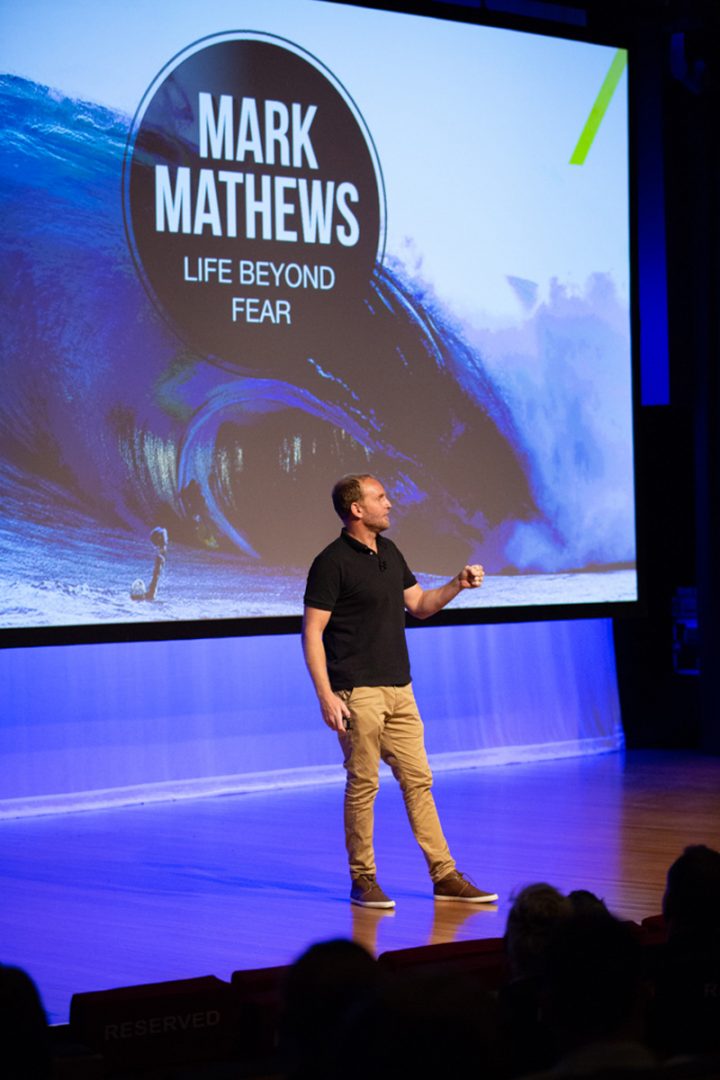
You were doing a lot of the keynote talks before the accident, has it really galvanised your thinking and your motivation to get back surfing again?
Yeah, for sure. It just reinforces it. My whole thing is that there’s so much knowledge and framework around performance. What I really like is that I can take it and put it into practice and see what works the best.
As much as I wouldn’t go back and do this injury again, it’s just a really good testing ground to put those things into practice and it forces you to do the work. It just reinforces and proves again how powerful these sort of motivational techniques and the reframing of the perspective is. The hard part is that you do it all and you get crazy results but then you get complacent.
And I’ve done that throughout my career. You get complacent and you think you’re invincible and you travel along and you stop doing all the stuff that makes you deal with stress for long periods.
Then you start to redline again and the stress gets a hold of you. That’s when in my world a wipe out comes because you get run down, you make a mistake in the surf, your body is not dealing with the wipeouts as well and you get injured.
For corporates, it’s almost worse because they don’t get the wipeout to shock them back in on the right road, they just keep going. And then their wipeout is some sort of physical disease because the level at what they’re operating at is crazy. Not enough sleep, bad diets, no exercise, crazy stress of decision making, dealing with people, all of this different stuff.
They’re just red lining for so long. The first roadblock, aside from their performance going down a bit, is usually the cardiologist coming in and saying, ‘There’s something wrong with your heart, high blood pressure, this disease and this disease.’ That sort of stress is a bigger factor than anything else in my opinion. I’m not a doctor but I reckon that’s the most dangerous one.
It’s amazing when you talk about all these guys who are operating like that. In many ways it is more dangerous than big wave surfing.
It’s just because you can mask it for a good extent of time and that’s the dangerous thing. If you mask it for too long, it feels like that’s the norm then. You’re running on that high level of stress; waking up tired every morning but needing three shots of coffee, you think that’s normal.
But if you keep that as your norm, it’s dangerous down the track. You have to realise that the reality is there’s a huge chance that you’re shaving years off your life. And for some people, that’s a worthy sacrifice, they don’t care. A lot of athletes will drive themselves to explosion. They don’t care, that’s what they want to do.
I think people need to know that that’s the reality. There are better ways to do it. You can still get the results and not be on that red line.
Have you started to see corporates particularly start to shift things on the back of what you’re talking about?
For sure and I just would not do it if I didn’t get that feedback because doing this is scarier than surfing. It’s more stressful, the anxiety I get from speaking is way harder than surfing. It’s crazy.
But it’s just those occasions where I get a personal message from someone and it touched their lives in some sort of positive way, that feels good. That’s worth the stress, that’s worth the anxiety.
I’ve had a few of those messages, I’ve had one really powerful one. I’m sure I wasn’t the sole reason that helped this guy so much, but for him he was in that super dark place of depression and suicide and it was enough to just spark a little change in him. He then went to the doctor got onto the right medication and onto a path of recovery.
He wrote to me about a year after he heard my talk. What I do is not framed for someone like that, but that worked for him. It got him on the right path. Those ones make it all worth it.
Maybe there’s a level of social anxiety of living up to this expectation that we set ourselves.
I’m living proof of that. That’s the biggest stress in my life. The fear and the stress that I deal with is way more prevalent in my speaking work than in surfing life-threatening waves. Which seems ridiculous but there’s something that’s hardwired in all humans. Scientists will say it’s from an evolutionary aspect of hundreds of thousands of years ago. If you weren’t part of the tribe and you got shunned into the plains of Africa or wherever it was, you can’t survive alone in the wild. So this is what they think is that subconscious evolutionary survival mechanism where you equate people liking you or not liking you to the fear of physical harm or death. It’s like the wires in your brain are crossed.
So if that’s a reality, if you add the fact that we live with so many people, the fact that we’re that interconnected and that social media is this new thing in the last 10 years, it just heightens that to the extreme and it’s just taking people’s stress levels through the roof. They’re on some level dealing with the fear of death non stop when it’s not even a reality, it’s like the wires are crossed in our brains.
How many likes you get on a photo is equated to whether you’re going live or die. Or if you fail at work or get embarrassed at work or you’re not good enough, is equated to if you’re going to live or die. The response physiologically is exactly the same. All the neurochemicals, increased adrenaline, cortisol, all the different stuff that happens is exactly the same when you’re under physical harm or attack, there’s no difference.
I feel like humans need to be rewired to survive the age of social media and interconnectivity. It will happen, we will naturally rewire, but it’s the same as all evolution. Only the strong survive and the other people are going to struggle to deal with it.
When you look to your peer group and you see a lot of their life through Instagram and social media, it’s the best bits of life, it’s not all the dark stuff.
Exactly, it’s not real. And then your constantly judging what your life is like. If you structure the information coming in from your social feed to be positive, that’s awesome, that’s motivating. But if your whole feed puts you in the mindframe that you’re not good enough, how bad is that?
It’s just psyche for the rest of your day, that’s how you start your day. That’s going to take its toll no matter what. And that’s the paradox of humans being crazy intelligent. The problem with that is it brings immense suffering because you’re so smart that you’re constantly analysing your environment so much. Then when those wires get crossed, the fear of physical harm and emotional harm are crossed. It feels like the most dangerous time that you’ve ever lived in and the reality is that it couldn’t be safer.
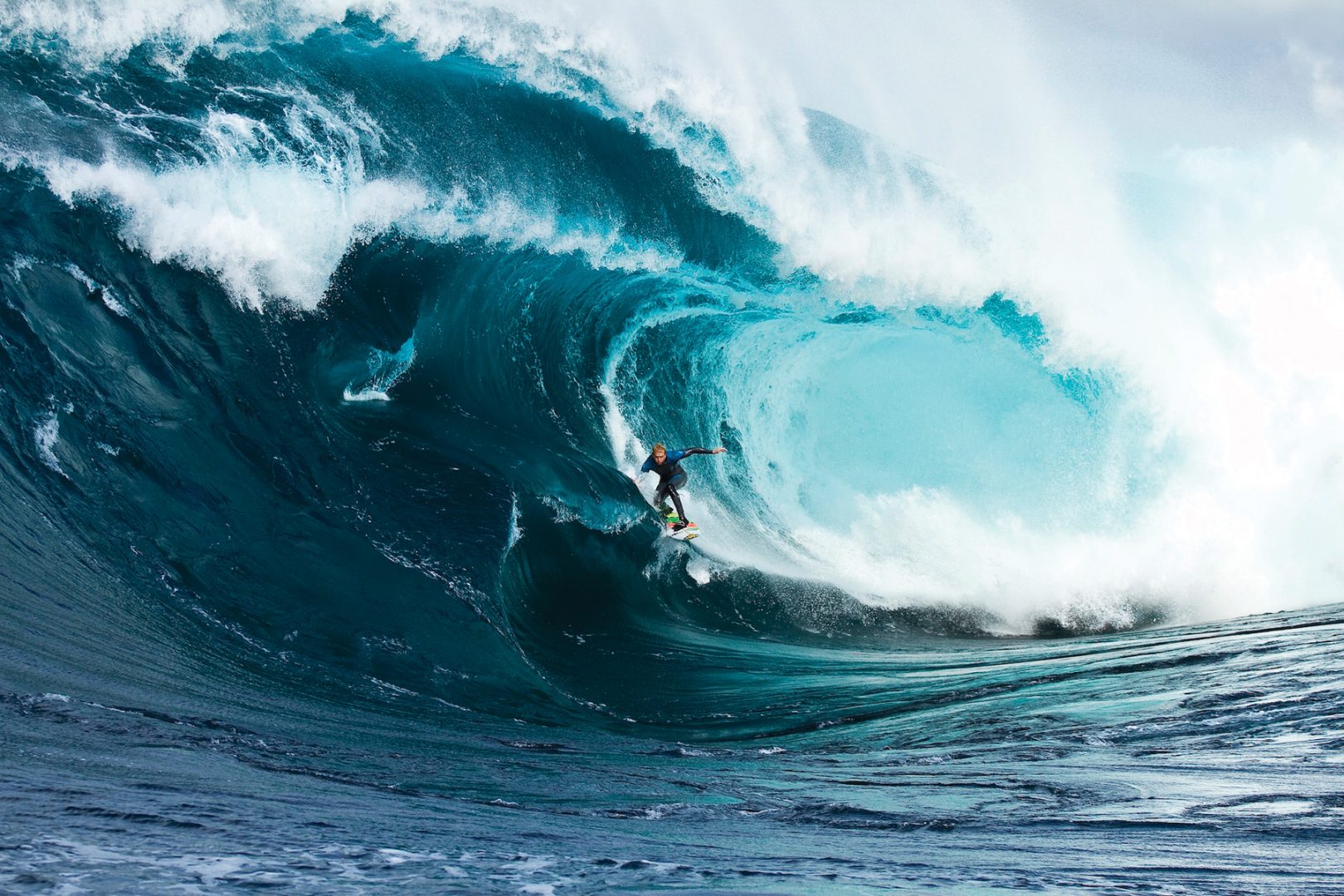
With your time around these corporates and companies, are you inspired to get into different businesses?
I do love the parallels that you find in business and professional sport. It’s all performance, the same frameworks apply across the board. I love the parallels and then I love being able to take anything I do in my professional surfing career and trying to implement that into my speaking career.
I did some work with Mick Fanning where we put a surfboard company together and I have so much more of an understanding of what corporates are going through. Experiencing the pressure of making business decisions and realising how hard it is; the hiring and firing of staff and dealing with your team and the cross-cultural stuff within the team.
There’s just so much stuff in there that requires you to be smart around performance and dealing with stress and fear. That’s kind of the niche that I like best about performance is dealing with that stress. I love taking that in too, the business world. My focus will be speaking and some business stuff on the side around the surf industry. But I definitely like trying to implement it in different ways. It validates whether it works or not.
There seems to be an increasing demand for motivational content these days, are you thinking about the potential to put your insights into a book or two?
I’ve been offered a bunch of publishing deals to write one and put it out there. But I have this roadblock with books. People go down that self-help trap where you’ll read an amazing book that gives you everything you need to be successful, but rather than then go and do the hard work, you just pick up another book. It’s just like hiding.
There is nothing I can write that’s not written, I am not that creative. There is a wealth of knowledge out there and all I would be doing is rewriting what other people have written. It’s the same stories in all self-help books. So I just have a barrier around that. Everytime I go to write something, it’s like I’ve read this somewhere else before, I can’t rewrite it.
I can frame it around surfing but I’d rather do that in a different medium. We created a movie ‘Fighting Fear’ with a friend so that was a cool way to do it, something a little different. I might go down that route but, trust me, you don’t need to buy my book. It won’t be anything new. Just stick with the one book you read and do what it says.
Are you reading any books at the moment?
I listen to a lot of podcasts now. I don’t read any books. I’ve read hundreds of books over the years, especially around the topics of fear and resilience and self-help and all the psych stuff. I’ve done all the different Harvard psych lectures, I love that world.
What are your top podcasts?
I love Joe Rogan’s podcast because I’m a huge UFC fan. And he has some pretty cool guests in lots of different fields. I feel like he’s a pretty honest character, where he’s not trying to sway your opinion all the time and he gives the two polarising opinions of one topic.
That is a must because if you get a podcaster that only presents one side of the story, they’ll convince you of anything. He does a pretty good job of doing both so he’s probably my favourite.
Did you listen to or watch the one with Elon Musk?
Yeah, I watched that one live. I try and catch his show live every now and then on YouTube and yeah, that was an interesting chat. You can tell that Elon Musk’s brain works very differently to a lot of people’s brains, so that was pretty interesting.
It’s fascinating to see the supposed ramifications of that and how the share price dropped. But I love that fact that he was brave enough to go on there and do what he did because most exec’s wouldn’t as they would be too worried about how they come across.
I like someone who would do something like that because it means that they’re not scared of being wrong or saying something dumb. They just hold the facts at a higher value, whether they make mistakes or not, it doesn’t matter so much.
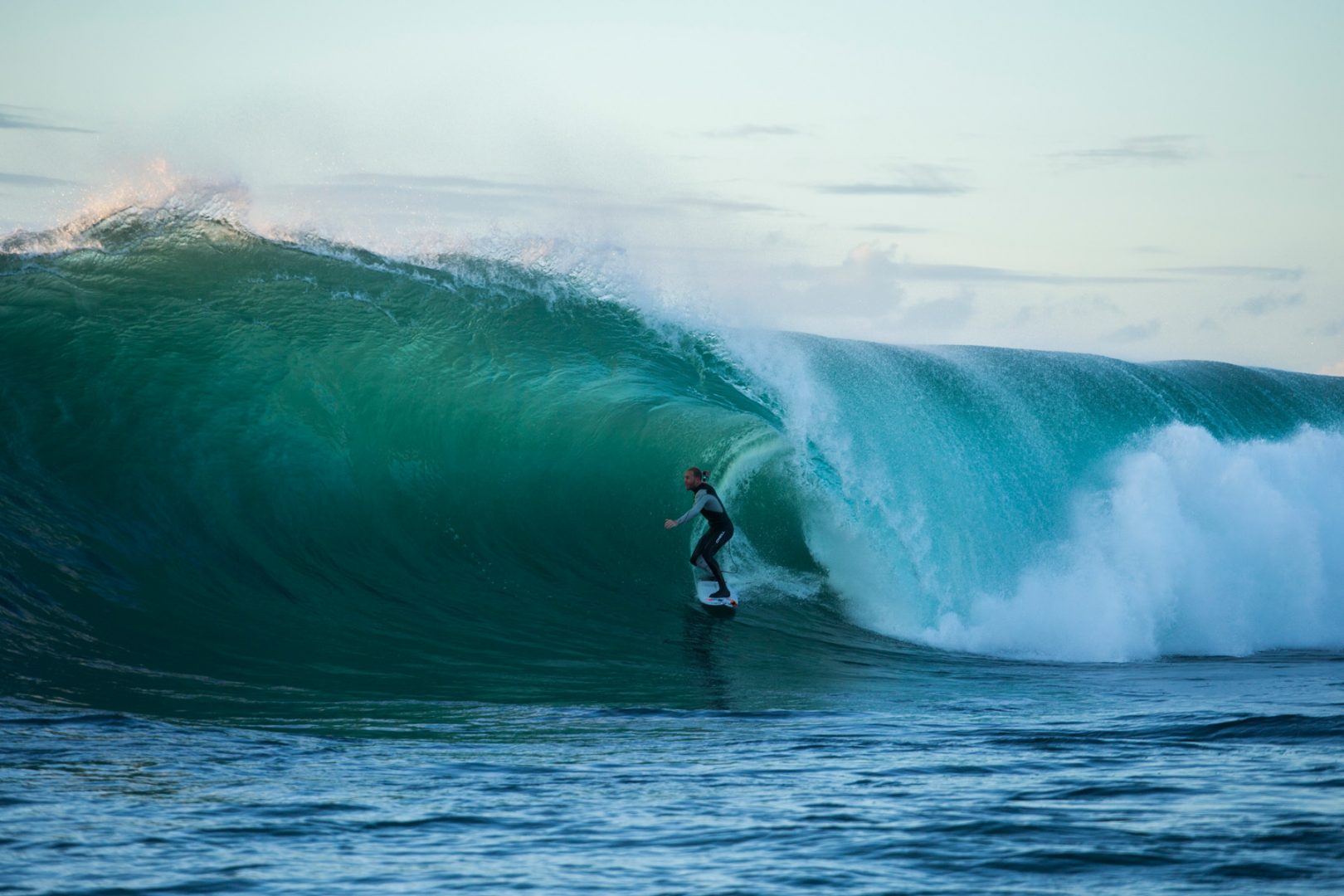
Do you think business would be better in general if people weren’t afraid to be honest and transparent regardless of running the risk looking dumb?
From my limited understanding of business in general, it just seems like the listed company structure that has shareholders and stakeholders, in one way it brings funding to a company but it brings so much other stuff that makes it possible to function properly and it changes the whole dynamic.
You’re trying to make more money for people that aren’t providing a service. The company provides an awesome service, they make money from that, that’s awesome. Then all of a sudden there’s investors that want to make extra money out of investing and not necessarily providing a service.
That’s my crude understanding of that way all that works. It just seems like in this day and age you shouldn’t need that type of investment. When you can crowdfund something, you can sell a product before it’s even made – there’s your investment. It’s a truer form of investment, it’s not people trying to make money off gambling off the business.
So it just seems like that creates a lot of problems because the exec’s in companies are trying to please the investors, not the customer. They’re constantly just trying to keep the investment and that doesn’t always pertain as to whether that’s the best interest for the business or the customer.
You find public speaking more frightening than big wave surfing, does the fact that you’ve analysed fear change the way that you approach it?
I have the background voice in my head that’s read all the books and when I’m feeling the fear, at the same time, that voice in my head is analysing and telling me ‘This is why you’re feeling this fear because of this reason.’
So it’s a constant battle of feeling anxious. From what I can tell, a lot of that anxiety happens on multiple levels; it happens subconsciously on a genetic level, or on a culturally imposed level or on an experiential level that happened in the first seven years of your life. It’s all happening without you being cognitively aware of it.
So that sort of stuff can be a bit of a mystery and a rabbit hole if you want to dive in and find every reason why you feel fears about certain topics. It’s a rabbit hole and I’ve been down it trying to figure it all out and the reality is it can go that way or you can just be like ‘From today, if I do this, this and this, this is what changes that response.’ It won’t eliminate it, but it changes your ability to cope with it. And that’s usually experience and skills; getting better skills, getting more experience in the scary environment.
That’s what you’ve got to do from now on. Changing the skill level is what’s beneficial. That’s scary to do, so then it’ll end up being a motivational question; you’ve got to want that thing more than you fear doing what it takes to get the experience. That’s just a question people have got to ask themselves.
If I didn’t see an awesome career out of public speaking, there is no way I would’ve put in the work to do it, I would never just do that as a hobby. The desire’s got to be there, the outcome, the benefit.
You should be diligent in how consistently you remind yourself of why you do something. And you should do that in every moment that you are faced with some sort of tough decision. You’ll have a clearer perspective of what’s right and wrong in that moment, because otherwise your subconscious just grips you and makes you take the easy way out.
Even with that thinking, your brain will clarify at the speed of light all the reasons why you should take the easy option. It’s just hardwired for comfort, you’ve got to constantly battle that hardwiring.
What’s the best piece of advice you’ve ever been given?
‘You only live once.’
You get one shot, so you may as well go for it.

